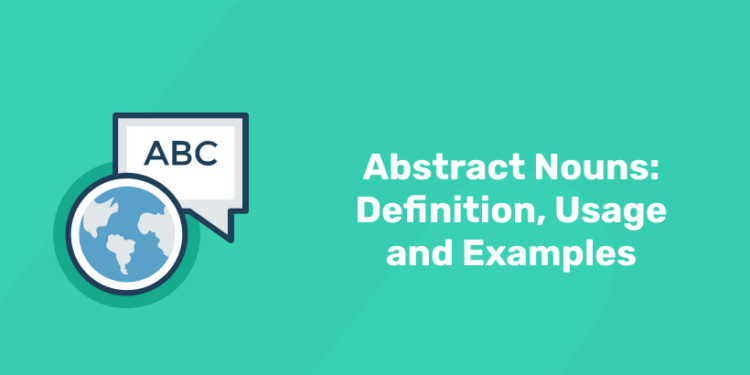Table of Contents
When we study grammar, we learn that nouns are the names of people, places and things. But what are abstract nouns? What makes them different from concrete nouns? Read on to find out about abstract nouns and their usages and examples.
An abstract noun is a concept that one cannot perceive with our five senses. It represents intangible ideas rather than objects that have a physical presence. Abstract nouns represent an idea, emotion, quality and sometimes even an event. They exist within the mind. Since there are no physical frames of reference, it is difficult to contain abstract nouns in grammar rules.
Elevate your speaking skills with our Spoken English Course!
Abstract Noun Examples
Some examples are in the table below.
Type of Abstract Noun |
Examples |
| Quality | · Fairness
· Courage · Kindness · Compassion · Honesty |
| State of being | · Freedom
· Splendor · Optimism · Misery · Agitation |
| Feelings | · Pleasure
· Fear · Sick · Sympathy · Hurt |
| Emotions | · Happiness
· Grief · Indifference · Rage · Love |
| Events | · Life
· Present · Death · Marriage · Birth |
| Concepts | · Cubism
· Relativity · Socialism · Meritocracy · Feminism |
| Ideas | · Humor
· Honor · Morality · Democracy · Belief |
Speak confidently and fluently with our Spoken English Course!
Abstract Nouns vs Concrete Nouns
The differences between abstract nouns and concrete nouns have to be studied deeply. But there is an easy way to differentiate them. If we can experience it using our five senses, they are concrete nouns. If that is not possible, then it is an abstract noun. The table below lists some examples of both nouns.
| Abstract Noun | Concrete Noun |
| Anger | Cat |
| Pain | Wool |
| Pleasure | Paper |
| Happiness | Shoe |
| Sympathy | Pants |
| Life | Table |
There are a few other things that you have to keep in mind while making this differentiation. Proper nouns are always concrete nouns as they are specific and tangible. But ideas derived from a proper noun are always abstract.
- Karl Marx- Concrete noun
- Marxism- Abstract noun
Similarly, an exact differentiation is sometimes not possible in their case. It could be ambiguous in some cases. For example, the word laughter, which is said to be an abstract noun, can be heard. And this would make it a concrete noun. The same applies to the words like ‘work’. We cannot sense it. But their result can be. We should understand that the distinction between abstract nouns and concrete nouns is unclear and heavily dependent on factors like context and the classifier’s definition of perceivable.
Countable and Uncountable Abstract Nouns
An abstract noun can be countable or uncountable depending on its usage. If an abstract noun has a broad or general meaning and represents all events then it is uncountable. But when it is used to mention a specific incident then they behave like a countable noun.
- Countable abstract noun: Time flies when you’re having fun.
- Uncountable abstract noun: The time I spend with you lasts forever.
Join our Spoken English program today and communicate with ease!
Forming Abstract Nouns with Suffixes
We can form an abstract noun by taking a verb, adjective or even concrete noun as a root word and adding a suffix to it. Consider the examples given under the titles below.
Converting Verbs to Abstract Nouns
The list given below shows some verbs and corresponding abstract nouns.
| Verb | Abstract nouns |
| Determine | Determination |
| Decide | Decision |
| Resist | Resistance |
| Perceive | Perception |
| Appoint | Appointment |
| Inform | Information |
| Enjoy | Enjoyment |
Converting Adjectives to Abstract Nouns
The list given below shows some adjectives and corresponding abstract nouns.
| Adjective | Abstract noun |
| Silent | Silence |
| Brave | Bravery |
| Sad | Sadness |
| Honest | Honesty |
| Independent | Independence |
| Responsible | Responsibility |
| Free | Freedom |
Speak confidently and fluently with our Spoken English Course!
Usage of Abstract Nouns
These points should be kept in mind while using abstract nouns.
- The rules that apply to other nouns apply to them as well.
- They can work as subjects as well as objects.
- They follow the capitalization rule
- They can take possessive forms
- They can be singular or plural. (But we have to distinguish whether they are countable or uncountable first.
- They are perfect in contexts like philosophical, existential, and ideological conversations.
- It is also ideal to use them in conversations regarding emotions and feelings.
- A sentence using abstract nouns should also contain concrete nouns to ground the concept in reality.
They tend to deviate from the traditional meaning of the word noun. But always keep in mind that abstract nouns and concrete nouns are identified based on their meaning rather than grammatical function. Grammatically they work the same in most cases.
Elevate your speaking skills with our Spoken English Course!
FAQ
- What is an abstract noun?
They are words that are considered a noun but cannot be perceived by touch, smell, vision, hearing or taste.
- Give a few examples of abstract nouns.
A few examples are freedom, Splendor, Optimism, Misery, Agitation etc.










